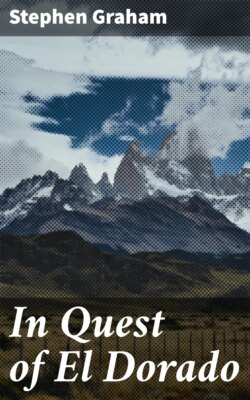Читать книгу In Quest of El Dorado - Stephen Graham - Страница 14
На сайте Литреса книга снята с продажи.
1
ОглавлениеTable of Contents
We left the beautiful harbor of Cadiz, with its white houses and palm trees and its daintily silhouetted towers and turrets, and the shores unclasped the blue bay and we rode upon the billows of the ocean.
The ship was a Spaniard and all the people on it were Spanish or West Indian, and the voyage we were making was the one Columbus made, seeking a new way to India and coming upon the Indies. And the first evening and every evening we pushed "our prows into the setting sun," not seeking, of course, but knowing, with the romance of the first journey mostly forgotten.
The passengers are mostly Cubans, and they kiss their hands to tell me what a fine place Cuba is, how perfect their capital. They put salt in their café au lait, plaster salt on their sliced oranges before eating them, and pour from the salad oil bottle on to every dish they eat. Their children, with bare legs, black hair, gold earrings, run about all day with little dogs on strings, and shout. There is no dancing on the ship, no orchestra, but instead Mass three times a week and the saloon made up as a chapel. The ladies are very big, if young, and lie in deck chairs doing nothing. The men play dominoes and smoke cigars.
We put in at Teneriffe and take on crates of onions for twenty-four hours. Boys in boats beset us with canaries in cages, pups in sacks, and fat, wise-looking parrots on perches. The reek of onions drives out the stowaways from the hold. Onions litter the bottoms of the empty barges, squashed onions disfigure our decks. Indeed, everybody and everything smells of onions for two days.
The food is Spanish and of a sort the sailors of Columbus must have known. All is cooked in olive oil, and I notice the Cubans and Porto Ricans are not pleased if the plates do not gleam. Heaped-up plates of rice and chicken, rice and little bits of rabbit, rice and bits of beef come nearly every day, and Spanish omelettes and olive stew and remarkable dishes of highly spiced fish covered with flaming pimento. There is an excellent table wine of which there is an inexhaustible supply and it is free as air, and there is a glass of sherry for every one on Sunday evening. The Spaniards do well on this. Even little Maria Luisa, aged ten, and Ysabel, aged eight, my two best friends, have their wine and sherry and disperse with vigor the oily heaps of food. One evening these precious little girls borrowed some matches—what to do?—to finish smoking a fat Habana cigar which one of the men passengers had left on deck!
The children talk to one another more by gestures than by words, and I shall never forget how one of them, Palmyra, described a bullfight she had seen at Barcelona and the horror of it, lowering her head between her shoulders and looking out with gleaming eyes to imitate the bull, jumping to indicate terror and assault, putting her little hand before her eyes at the thought of the disemboweling of the horses, and showing with a horrified twinkling of her fingers the impression of the flowing of the blood. Bullfights are forbidden in Cuba, but these children had been to Spain on a holiday and so had seen the national and traditional festival for the first time.
In fifteen days on a little ship with two dozen passengers one naturally learns a great deal. An English person is a rarity on such a ship, and every one sought to engage me in conversation. They were as much interested in Cristobal Colon and Ponce de Leon and Nuñez de Balboa as I was, and had pictures of Columbus in their pocketbooks, and thought how greatly he'd have been struck to be traveling on such a boat as ours.
This one is a beautiful voyage, so serene, with blue skies every day and a just-waving sea and a breeze behind the boat that wafts our smoke ahead of it. It is delicious to sit up on the very nose of the vessel and be a Columbus now. We are splashing it new, splashing it white, in stars and white balls and darts of surprised foam. Green and yellow seaweed sags up from the depths of the ocean and, like untraversed liquid glass, the sea is ahead of us in curving lines, in natural wild parallels to the sun. It is afternoon, the sun is going over and will go under. He is drawing us on, and I could almost believe our steam counts for naught. He is illuminating the wide empty ocean, and we stare till we veritably see latitude and longitude upon it. We ascend, we lift, we rive a way o'er the mirror in virginal v's of new frothing foam. We are making for the center of the far horizon, the sun ahead of us; we are making a new way to India; we are going to make West East.
